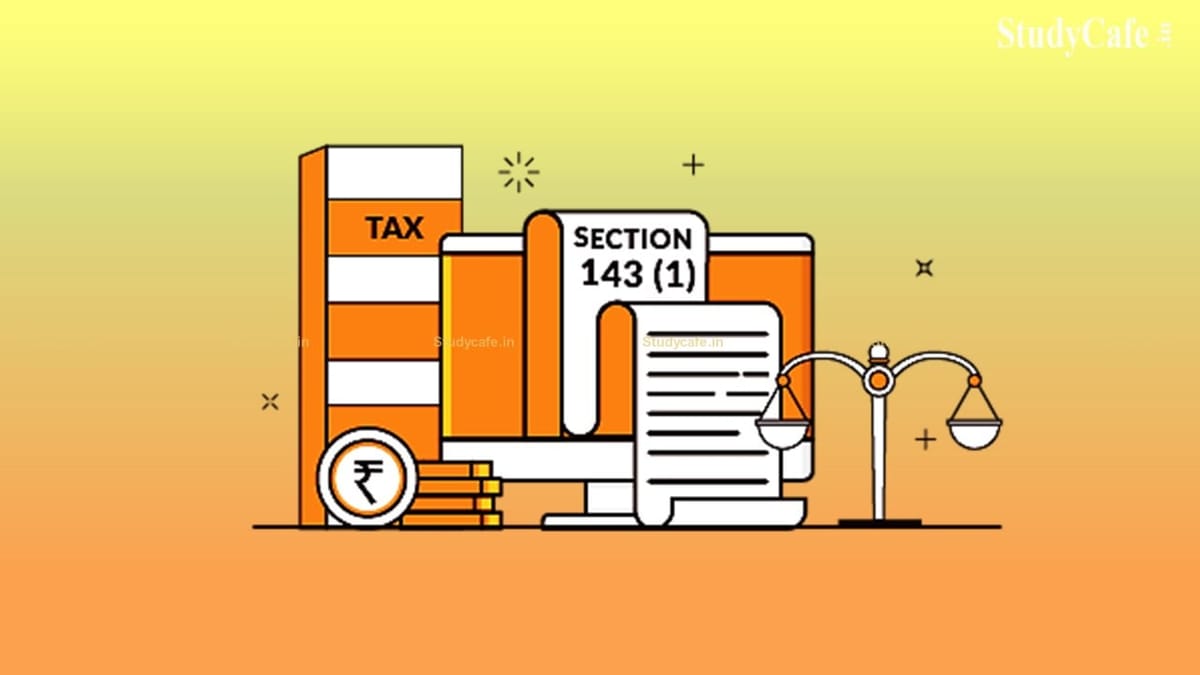Intimation Under Section 143(1) of Income Tax Act
Deepshikha | Dec 21, 2021 |

Intimation Under Section 143(1) of Income Tax Act
The taxpayers’ income tax returns are first processed online at the Centralised Processing Centre (CPC). Following the processing of the return, the IRS issues an intimation to the taxpayers under section 143(1) alerting them of the results.
A tax return can be filed voluntarily under Section 139 or on the income tax department‘s demand under Section 142. (1). It’s important to know what happens after a taxpayer files an income tax return. The Internal Revenue Service conducts a preliminary examination of all returns submitted and notifies taxpayers of the results of that examination. This examination focuses on arithmetical errors, internal inconsistencies, tax computation, and tax payment verification. Under Section 143, such notice to the taxpayer after the preliminary assessment is referred to as intimation (1). The preliminary evaluation is completed entirely by machine, with no human participation, and is sent to the Centralised Processing Center (CPC).
With the rapid increase in the number of income tax returns filed and a jurisdiction-based processing methodology for all returns filed, the tax department encountered issues that resulted in income tax returns being processed late.
As a result, the Finance Act of 2008 empowered the Central Board of Direct Taxes (CBDT) to devise a method for centralised return processing to determine the tax payable by, or the rebate due to, taxpayers more quickly. The department selected the strategy that CPC in Bangalore would process paper and e-returns without any engagement with taxpayers and in a jurisdiction-free manner, based on the suggestions of the Technical Advisory Group.
Citizens and the tax department both benefited from the CPC project. Citizens benefitted from faster and easier preliminary processing of their returns, while the department was freed of a load of a preliminary evaluation, which could be computerised, allowing them to focus on other important tasks.
Taxpayers become anxious whenever they receive communication from the IRS. Intimation under Section 143(1), on the other hand, is not something to be concerned about. In this post, we will go over in detail the intimation sent under Section 143(1) to make it easier for taxpayers to deal with such intimation.
CPC’s initial return processing is fully automated, and Section 143(1) Intimation is similarly a computer-generated record. CPC compares data in each tax return to information in the income tax department’s records (such as form 26AS created from information provided by collecting banks, form 16, TDS returns, and so on), and this warning normally only highlights obvious errors discovered by the mainframe system.
After the return is filed, the computerised system recalculates total income or loss based on the department’s records and compares it to the information provided by the taxpayer.
‘As submitted by the taxpayer in the Return of Income’ and ‘As computed under Section 143’ are the two columns on the intimation (1).
Taxes deducted at source and paid by taxpayers in advance tax and self-assessment tax.
Adjustments are made to income as calculated under Section 143(1), and the ultimate tax liability or rebate is calculated.
Adjustments are made only after the taxpayer has been notified of the proposed adjustments, either in writing or through email to the email address specified in the income tax return filed.
Before making the final adjustment, the taxpayer’s response must be received within 30 days of the intimation’s issuance date, and if no response is received within that time frame, the modifications made previously will be adopted.
An intimation shall be prepared and sent to the assessee.
The many types of intimations that could occur are discussed below:
If there is a final tax liability, a demand letter will be delivered, and any refunds will be given to the taxpayer.
In case of any Doubt regarding Membership you can mail us at [email protected]
Join Studycafe's WhatsApp Group or Telegram Channel for Latest Updates on Government Job, Sarkari Naukri, Private Jobs, Income Tax, GST, Companies Act, Judgements and CA, CS, ICWA, and MUCH MORE!"